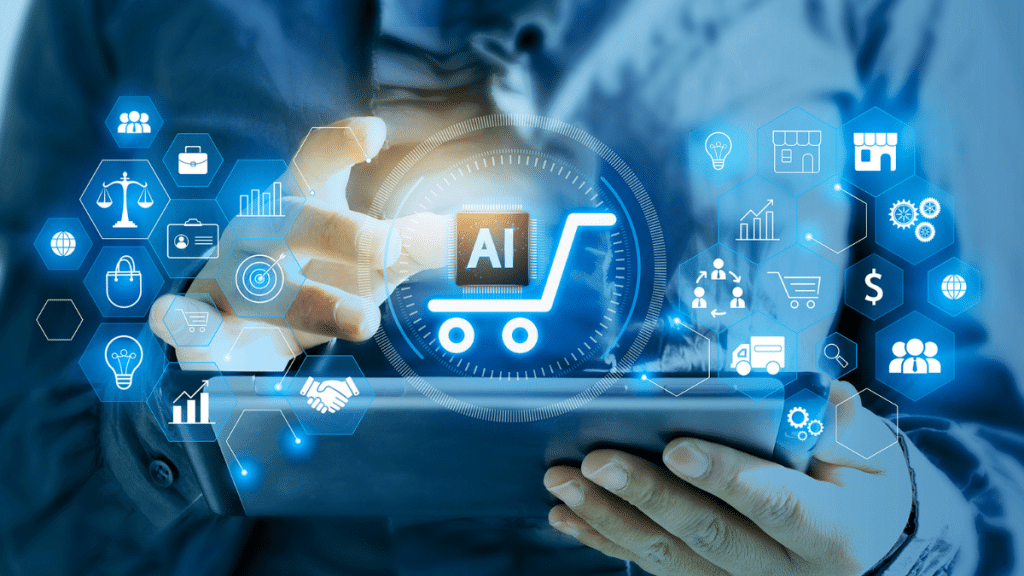The rise of artificial intelligence (AI) is no longer just a buzzword — it’s a defining force behind modern marketing strategies. Nowhere is this more evident than in the e-commerce sector, where personalization, automation, and data analysis are not luxuries, but necessities.
In today’s hyper-competitive online marketplace, AI marketing tools have become pivotal in enabling e-commerce businesses to scale efficiently, engage customers meaningfully, and drive revenue growth. From predictive analytics to dynamic pricing, the capabilities of these tools are transforming how e-commerce brands compete and connect.
Why E-Commerce Needs AI Now More Than Ever
E-commerce has exploded in recent years, fueled by shifting consumer behavior, mobile accessibility, and a pandemic-driven surge in digital shopping. With this growth, however, has come complexity: multichannel strategies, skyrocketing customer expectations, and vast data sets that need real-time interpretation.
Traditional marketing approaches — even digital ones — struggle to keep up with this level of complexity and personalization. This is where AI steps in.
AI marketing tools harness machine learning, natural language processing, and data mining to automate tasks, uncover patterns, and deliver real-time insights. For e-commerce brands, this means more informed decisions, improved ROI, and faster scaling.
Core Benefits of AI in E-Commerce Marketing
1. Hyper-Personalization at Scale
Personalization is no longer optional — 71% of consumers expect companies to deliver personalized interactions, and 76% get frustrated when it doesn’t happen, according to a McKinsey report.
AI tools help e-commerce marketers craft individual-level experiences across websites, emails, and ads by analyzing user behavior, purchase history, and intent signals. Product recommendations, retargeting ads, and even homepage content can be tailored to individual users in real time.
2. Smarter Customer Segmentation
Segmentation is essential for effective targeting. With AI, businesses can go beyond basic demographics to create granular audience segments based on behavior, psychographics, and predictive intent.
For example, AI can identify “at-risk” customers who are likely to churn and trigger personalized win-back campaigns, or segment customers based on their expected lifetime value, enabling more strategic resource allocation.
3. Predictive Analytics for Proactive Decision-Making
Rather than reacting to past performance, e-commerce businesses can use AI to predict future trends. AI marketing tools analyze historical data to forecast sales, identify seasonal patterns, and even suggest optimal campaign strategies.
This shift from reactive to proactive marketing allows e-commerce teams to stay ahead of demand, optimize inventory, and plan campaigns that align with customer buying cycles.
4. Intelligent Automation
AI enables intelligent automation across email campaigns, ad bidding, content creation, and chatbot interactions. Marketing automation platforms powered by AI can determine the best time to send emails, the optimal channel for engagement, and even auto-generate personalized ad creatives.
This saves time and reduces manual workload while improving performance metrics.
5. Enhanced Customer Support
Conversational AI, such as chatbots and virtual assistants, offers 24/7 support and can resolve common queries instantly. These tools not only improve the customer experience but also free up human agents to handle more complex tasks.
Advanced AI chatbots can also upsell or cross-sell products based on customer queries, turning support into a revenue-generating function.
Top AI Marketing Tools Powering E-Commerce Growth
As the demand for AI solutions grows, the market has responded with an array of platforms tailored to different e-commerce needs. From comprehensive marketing suites to specialized optimization tools, the options are robust and evolving.
For a deep dive into the most effective AI marketing tools across industries — including those that cater specifically to e-commerce brands — Improvado’s guide offers an excellent breakdown. It covers tools for content generation, customer analytics, social media marketing, and more, providing valuable insight for teams building their MarTech stack.
Case Study: AI-Driven Growth in E-Commerce
Consider the example of an online fashion retailer that implemented AI-driven personalization and dynamic pricing strategies. Using AI to analyze browsing data and past purchases, they created individualized homepages and retargeting ads for each visitor. Simultaneously, AI adjusted pricing based on inventory levels and demand elasticity.
The results? A 35% increase in conversion rate and a 22% boost in average order value within three months. This isn’t an isolated case — similar strategies are now becoming standard practice for forward-thinking e-commerce brands.
Challenges and Considerations
While the potential of AI is vast, implementing it comes with challenges. Data privacy regulations (like GDPR and CCPA), high-quality data requirements, and integration with existing systems can pose barriers.
Additionally, not all AI tools are created equal — it’s essential to evaluate tools based on transparency, scalability, ease of use, and vendor support. Businesses should start with clear goals and select tools that align with their marketing strategy, budget, and technical capabilities.
The Future: AI as the Foundation, Not a Feature
AI is quickly shifting from being a “nice-to-have” to a foundational layer across the entire e-commerce marketing ecosystem. In the future, we can expect AI to power everything from real-time voice commerce interactions to emotion-based product recommendations through visual AI.
As generative AI continues to mature, it will further transform content production, product design, and customer interactions. Forward-looking e-commerce businesses should not only adopt AI marketing tools but also embed AI thinking into their culture and workflows.
Conclusion
The integration of AI marketing tools into e-commerce strategies isn’t just a technological upgrade — it’s a competitive imperative. From personalizing the customer journey to predicting market trends and automating complex workflows, AI empowers brands to deliver smarter, faster, and more relevant experiences.
If you’re looking to explore the best tools available, check out this detailed guide on AI marketing tools to find solutions that can transform your e-commerce performance in 2025 and beyond.
